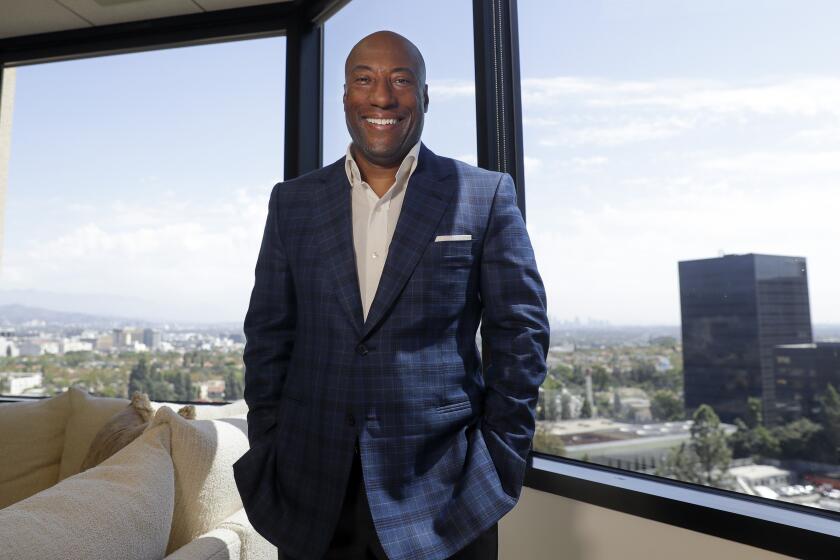Disney Proxy Details Eisner Salary, Bonus : New Chairman to Get $750,000 a Year, 50% Above Predecessor
- Share via
Michael D. Eisner, who was named chairman and chief executive of Walt Disney Productions last September, received a one-time payment of $750,000 to join the Burbank-based company and will receive a base salary of $750,000 annually for five years, according to a proxy statement mailed to Disney shareholders.
Eisner’s base salary is 50% higher than that paid his predecessor, Ronald W. Miller, who was ousted last September after he lost the board’s confidence during a protracted effort to ward off unwelcome investors in the entertainment company.
Miller, a son-in-law of company co-founder Walt Disney, has been paid $2.4 million to settle his five-year employment contract, according to the proxy statement.
$1.77 Million to Watson The proxy, mailed in the past few days, also disclosed that Raymond L. Watson, chairman of the company until Eisner’s appointment, has received a payment of $1.77 million to terminate his employment agreement. Watson, who continues to serve as a director and has been elected chairman of the company’s executive committee, will now receive a director’s fee of $20,000 a year and $500 for each meeting attended.
Until last year, Disney’s top executives were not paid as much as most top entertainment company officials in Hollywood. Miller, who became chief executive in February, 1983, received $315,728 in cash compensation that year but received a 33% increase last May, boosting his base salary to $500,000.
(By comparison, Lew R. Wasserman and Sidney J. Sheinberg, the two top executives at MCA Inc., parent of Universal Pictures, each received cash compensation of $500,000 in 1983, and Barry Diller received a base salary of $475,000 as chairman of Paramount Pictures Corp. until he left last September to join 20th Century Fox Film Corp.)
Eisner, 42, will also receive an annual bonus equal to 2% of the dollar amount by which the company’s net income exceeds a 9% return on stockholders’ equity, the proxy said.
The document also revealed that two Disney directors, Philip M. Hawley and Robert H. B. Baldwin, are not standing for reelection at the annual shareholders meeting scheduled for Feb. 6 in Anaheim.
Time to Step Down Through prepared statements, both men praised the incumbent management but said they considered it an appropriate time to step down.
Hawley, as president and chief executive of Los Angeles-based Carter Hawley Hale Stores Inc., fought off an unwelcome tender offer for his own company last year shortly before Disney was thrown into similar turmoil in March, when New York financier Saul Steinberg was aggressively accumulating Disney shares. Disney eventually bought out Steinberg.
Hawley, a Disney director since 1975, wanted former 20th Century Fox Chairman Dennis C. Stanfill named to the chief executive’s job last September, according to sources, but he was outmaneuvered by the Bass family of Fort Worth, the largest individual shareholders in Disney, and representatives of the Roy E. Disney family, who favored Eisner and former Warner Bros. Vice Chairman Frank Wells as president.
Baldwin, chairman of the advisory board of Morgan Stanley Inc., Disney’s sole investment banker at the time, was elected to Disney’s board in 1983.
In response to a question, Disney Vice President Erwin Okun said the company continues to consult Morgan Stanley on “important financial matters” but added: “We are considering other financial concerns on a project-by-project basis.”
The proxy disclosed that Wells is receiving a base salary of $400,000, with an annual bonus equal to 1% of the amount by which the company’s net income exceeds a 9% return on stockholders’ equity. Wells also will receive a one-time payment of $250,000 during his first year as a bonus for joining Disney.
In addition, Disney’s directors have created a new bonus pool of $3.5 million for employees of the company, with the exception of its Arvida subsidiary, which already has its own bonus plan.
The proxy also revealed that Disney’s board has voted to amend the company bylaws to permit loans and guarantees to officers or directors. Although no loans have been made pending shareholder ratification of the bylaw change, Eisner’s contract provides that loans will be made to him in “reasonable” amounts to facilitate his exercise of Disney stock options.
The proxy shows that Eisner holds options to buy 510,000 Disney shares at an average of $57.44 per share, which would cost a total of $29.3 million.
More to Read
The biggest entertainment stories
Get our big stories about Hollywood, film, television, music, arts, culture and more right in your inbox as soon as they publish.
You may occasionally receive promotional content from the Los Angeles Times.










